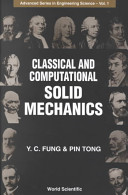Engineering Requires Science
Engineering is quite different from science. Scientists try to understand nature. Engineers try to make things that do not exist in nature. Engineers stress invention. To embody an invention the engineer must put his idea in concrete terms, and design something that people can use. That something can be a device, a gadget, a material, a method, a computing program, an innovative experiment, a new solution to a problem, or an improvement on what is existing. Since a design has to be concrete, it must have its geometry, dimensions, and characteristic numbers. Almost all engineers working on new designs find that they do not have all the needed information. Most often, they are limited by insufficient scientific knowledge. Thus they study mathematics, physics, chemistry, biology and mechanics. Often they have to add to the sciences relevant to their profession. Thus engineering sciences are born.
Notes:
Science passively observes, but Engineering must discover what it needs in order to make progress.
Folksonomies: science engineering
Taxonomies:
/science (0.612649)
/art and entertainment/visual art and design/design (0.506215)
/science/engineering (0.468688)
Keywords:
insufficient scientific knowledge (0.995330 (negative:-0.449881)), characteristic numbers (0.894601 (neutral:0.000000)), innovative experiment (0.881989 (positive:0.597816)), computing program (0.872649 (positive:0.385761)), Science Science (0.869977 (negative:-0.262833)), concrete terms (0.858682 (positive:0.661903)), new solution (0.845320 (positive:0.544837)), new designs (0.832407 (neutral:0.000000)), engineering sciences (0.799159 (neutral:0.000000)), engineers (0.684775 (negative:-0.656498)), invention (0.677761 (positive:0.005405)), nature (0.592698 (neutral:0.000000)), gadget (0.524846 (positive:0.288102)), progress (0.503988 (positive:0.355906)), idea (0.500983 (positive:0.661903)), dimensions (0.499770 (neutral:0.000000)), Scientists (0.497480 (neutral:0.000000)), profession (0.495820 (positive:0.329276)), things (0.494195 (neutral:0.000000)), device (0.493074 (neutral:0.000000)), improvement (0.489398 (positive:0.455841)), people (0.488241 (positive:0.507525)), material (0.486755 (neutral:0.000000)), method (0.486599 (positive:0.302694)), mechanics (0.486111 (neutral:0.000000)), problem (0.485819 (positive:0.544837)), geometry (0.483992 (neutral:0.000000)), information (0.482963 (neutral:0.000000)), mathematics (0.479930 (neutral:0.000000))
Entities:
engineer:JobTitle (0.819255 (negative:-0.028800))
Concepts:
Science (0.980088): dbpedia | freebase | opencyc
Physics (0.886686): dbpedia | freebase | opencyc
Engineering (0.876193): dbpedia | freebase
Mathematics (0.846485): dbpedia | freebase | opencyc
Scientific method (0.740125): dbpedia | freebase
Nature (0.653786): dbpedia | freebase | opencyc
Natural science (0.584369): dbpedia | freebase
Experiment (0.539253): dbpedia | freebase | opencyc





